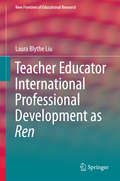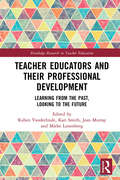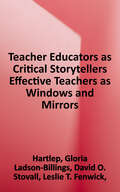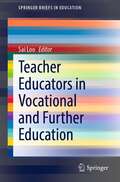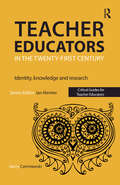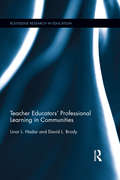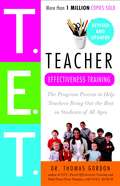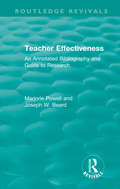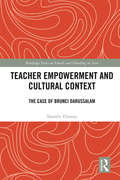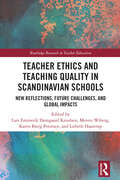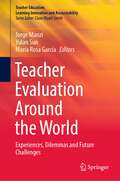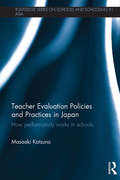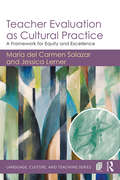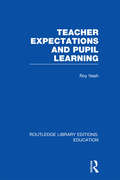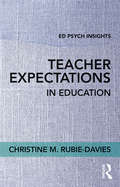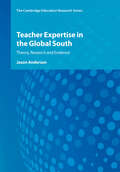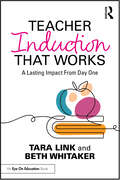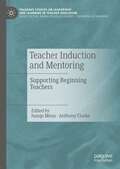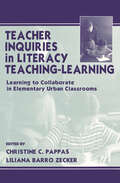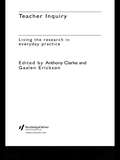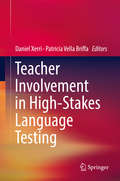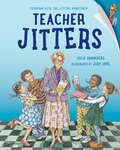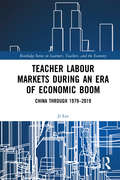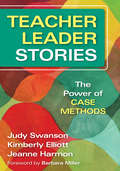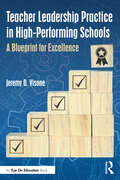- Table View
- List View
Teacher Educator International Professional Development as Ren
by Laura Blythe LiuTeacher-educator international professional development involves personal and professional, research- and practice-oriented, and pragmatic and aesthetic growth. This text encourages teacher educators to explore this work as Ren, or benevolent human beings, in cultivating global professional communities. As faculties engage in Ren as a vital 21st century form of development, new insights may emerge for how to revive and apply this concept in our changing global society. This text begins by discussing evolving concepts of achievement in an era of globalization, contrasting comparative conquest with global notions of relational integrity. Evolving aspects of achievement in 21st century China are also included. The text goes on to explore aspects of 21st century teacher quality and professional development, before presenting a theoretical framework for the international professional development of teacher education faculties as a process of becoming professional individuals, research-based practitioners, and aesthetic engineers. Narrative inquiry, including the aesthetic approach employed in this text, is described as the research method used to explore the development of 15 faculty participants in this text's case study of one teacher education research center at a Chinese university. Findings from the author's two-year immersion at the research site involve three overarching "complementary contrasts," or "tensions held in balance," across the 15 faculties in this study. These tensions included harmonizing (1) community and individuality, (2) adaptability and expression, and (3) authority and compassion. The findings are discussed in light of the original theoretical framework for teacher-educator international professional development by integrating participant interviews, research publications, and further observations into current academic discourse. The text concludes by offering implications for teacher-education practice, research, and policy for China, and other countries including the U. S. , and suggests how the findings connect to global academic discourses on teacher-educator professional development across international settings.
Teacher Educators and their Professional Development: Learning from the Past, Looking to the Future (Routledge Research in Teacher Education)
by Ruben VanderlindeThis book focuses on the professional development of teacher educators, forming a definitive and expert resource for all those interested in this area of professional learning. It offers an in-depth overview of existing international research and professional development initiatives in the area of teacher educators’ learning. The book highlights relevant research on the topic, identifies the lessons learnt from recent initiatives, and indicates ways forward for teacher educators’ professional learning internationally. It provides a unique combination of six years of pan-European collaborative work, resulting in a book with clear relevance and appeal to both academics and practitioners internationally. The book conceptualizes teacher educators’ professional development, in order to deepen understanding of how and why learning occurs and conducts empirical research into the professional development needs of teacher educators internationally using quantitative and qualitative methods in order to redress gaps in existing research. This book will be of great interest to academics, researchers and post-graduate students in the fields of teacher education and professional development and learning.
Teacher Educators as Critical Storytellers: Effective Teachers as Windows and Mirrors (The Teaching for Social Justice Series)
by Gloria Ladson-Billings Nicholas D. Hartlep Antonio L. Ellis David O. StovallBreaking away from the historically dominant narrative that White females make the best teachers, this book contends that effective teachers can be both "windows" and "mirrors" for students. Teachers should reflect the student population in racial and cultural terms while also serving as windows for students to see opportunities that lie outside of their immediate circumstances. Employing a critical storytelling framework, respected scholars share the teaching practices of influential teachers that they learned from. Chapter authors are diverse teacher educators from the fields of education, educational psychology, administration, policy, and curriculum and instruction. Each storyteller identifies key concepts and principles that explain why the selected teacher was so memorably effective. This inspirational volume provides a series of templates that help pinpoint the attitudes and behaviors of those teachers who make a positive difference in the lives of their students. Book Features: - Highlights contributions from diverse teacher educators, including Asian American, African American, Latinx, and Native American. - Examines the long-lasting impact that a teacher's race, ethnicity, and/or indigeneity can have on the lives of their students beyond high school and college. - Includes analyses drawn from research on identity in teacher education, theory, and research in education, psychology, and human development. - Contains photographs, images, charts, and diagrams to assist readers.
Teacher Educators in Vocational and Further Education (SpringerBriefs in Education)
by Sai LooThis book includes a range of empirical-based international contributions by the global community of teacher educators and related researchers on the Further Education/post-compulsory, vocational/occupational and lifelong learning sector.It offers theoretical frameworks and empirical data to delineate issues relating to teacher educators and training in areas regarding policy, programmes, and pedagogic activities. Some of these areas include the education of teachers in vocational education, the professionalization of teacher educators in a neoliberal education system, and teacher educators' perspectives of a training programme for vocational education and training. Additionally, the areas cover the relevance of coherence in vocational teacher education for teacher educators, the use of questioning strategies for teacher educators, teacher educators and their initial disciplines, journeys and job titles, the relevance of craft and reflectivity of teacher educators, and the importance of teacher education and mentoring scheme. The rationale for this book is that there is a comparative lack of research and related publications on teacher educators and the delivery and design of teacher education facilitation in the sector internationally. Also, the FE sector is viewed as a backwater of educational research compared to the other sectors.
Teacher Educators in the Twenty-first Century: Identity, knowledge and research (Critical Guides for Teacher Educators)
by Gerry CzerniawskiThis book links theory, policy and practice in a critical examination of the relationship between the professional identity, knowledge, learning needs and research experience of teacher educators. The book concludes by drawing these themes together as a means to support the induction and further professional development of teacher educators. Teacher educators have, until relatively recently, been invisible in the eyes of policy makers with little attention given to their induction and professional learning needs. This book draws on a growing body of research on this diverse profession within a context where, in many countries, the school practicum plays an increasing role in the training and education of teachers. The recent policy gaze of the European Commission has added further momentum to the attention being given to teacher education, its educators and the role they play in pupil achievement. However for many beginning teacher educators little support is offered at the start of their new career trajectories in schools, colleges or universities. This book examines some of the issues surrounding these career transitions and the implications they have for professional learning. It serves as an invaluable yet accessible source of knowledge for all those interested in the professional learning needs and recognition of this heterogeneous occupation.
Teacher Educators' Professional Learning in Communities (Routledge Research in Education)
by Linor L. Hadar David L. BrodyTeacher Educators’ Professional Learning in Communities explores teacher educators' professional development in the communal model of learning. Learning in groups has proved to be a major avenue for supporting such development and change among teachers and other professions, but one which has received sparse attention with regards to teacher educators’ development. This book aims to examine such communities in order to identify factors that promote or hinder professional learning for teacher educators. Blending research on communal learning with seven years of practical experience in these contexts, the authors present their analysis of the communal professional development process and provide a conceptual basis for understanding this type of professional learning for teacher educators. The book addresses organizational aspects of teacher educators’ learning in communities, such as creating a safe environment, group reflection, feedback and discussion about student learning. Personal professional learning aspects are also explored, including the reduction of personal isolation, the process of transition towards change, and withdrawal from the goals of the community. Finally, influences and implications for professional learning among teacher educators are discussed. Teacher educators stand at the crux of the entire educational enterprise, because of their responsibility in training the next generation of teachers. As such, their professional development is increasingly important in promoting and advancing educational practice. Integrating current literature with pictures of practice about the use of the communal model in professional development in educational settings, it will be of key interest to researchers and postgraduate students in several fields: professional development, teacher educators, and communities of learners. Practitioners who are involved with the professional development of teacher educators will also find this book extremely useful.
Teacher Effectiveness Training: The Program Proven to Help Teachers Bring Out the Best in Students of All Ages
by Dr. Thomas GordonFor nearly thirty years, Teacher Effectiveness Training, or the T.E.T. book, based on Dr. Thomas Gordon’s groundbreaking program, has taught hundreds of thousands of teachers around the world the skills they need to deal with the inevitable student discipline problems effectively and humanely.Now revised and updated, T.E.T. can mean the difference between an unproductive, disruptive classroom and a cooperative, productive environment in which students flourish and teachers feel rewarded.You will learn:• What to do when students give you problems• How to talk so that students will listen• How to resolve conflicts so no one loses and no one gets hurt• How to best help students when they’re having a problem• How to set classroom rules so that far less enforcement is necessary• How to increase teaching and learning time
Teacher Effectiveness: An Annotated Bibliography and Guide to Research (Routledge Revivals)
by Marjorie Powell Joseph W. BeardOriginally published in 1984, the field of research on teaching had expanded dramatically in the 15 years covered by this bibliography, 1965 to 1980. The expansion had included studies conducted for many purposes. This bibliography contains relevant citations to the research which has been conducted for the purposes of increasing our understanding of the science, art and craft of teaching. The existence of research publications has been documented with relevant reference information and brief annotations; there has been no attempt to evaluate the quality of the studies. A brief perusal of the bibliography provides an indication of the range of topics addressed by these studies and also of the variety of studies within a single topic.
Teacher Empowerment and Cultural Context: The Case of Brunei Darussalam (Routledge Series on Schools and Schooling in Asia)
by Shanthi ThomasTeacher empowerment is a psychological and socio-structural motivational process that enhances teacher performance and self-expression. The current conceptualisations of Teacher Empowerment, available in extant literature, have been constructed in an Anglo-Saxon, western cultural context. There have been attempts to transfer the concept to Asian countries, but these attempts were faced with major obstacles since the underlying cultural assumptions are not the same across countries. This book treads new ground by redefining Teacher Empowerment in the cultural context of South East Asia. Using the case of Brunei Darussalam which has a unique socio-cultural make-up as a melting pot of Malay, Chinese and other Asian cultures, the book offers a unique insight how the Teacher Empowerment dynamics is played out in this context. Covering more than just empowering leadership in schools, the author explores how colleagues, parents, and students empower teachers, and how teachers empower themselves. This book is a valuable guide for educators and educational leaders and researchers in Southeast Asia and beyond, who are committed to the empowerment of teachers, and the qualitative enhancement of the field of education as a whole.
Teacher Ethics and Teaching Quality in Scandinavian Schools: New Reflections, Future Challenges, and Global Impacts (Routledge Research in Teacher Education)
by Merete Wiberg Karen Bjerg Petersen Lars Emmerik Damgaard Knudsen Lisbeth HaastrupThis edited volume explores the idea that educational success in Scandinavian countries can be attributed to the inherent connectedness of teacher ethics and teaching quality, providing inspiration to teachers and school systems outside Scandinavia. Acknowledging that Scandinavian school systems are known for mirroring the welfare systems and democratic societies with respect for both institutions and individuals, this book explores new educational demands, possibilities, and research developments taking place in Scandinavian countries such as Denmark, Norway, and Sweden that place the education system, and teachers’ professional development and identities, under pressure. Chapters address teacher ethics and quality in relation to topics such as the dialogical teacher, democratic teaching, parental collaboration, and the ethics of classroom management to inform non-Scandinavian, international school systems and teacher education initiatives. Discussing current developments in the Scandinavian school systems and the emerging educational ideas and practices within them, this book will appeal to scholars, researchers, and postgraduate students studying teachers and teacher education, moral and values education, and teacher identities more broadly. It will also be useful to policymakers and teacher educators involved with teachers’ professional development more broadly.
Teacher Evaluation Around the World: Experiences, Dilemmas and Future Challenges (Teacher Education, Learning Innovation and Accountability)
by Jorge Manzi María Rosa García Yulan SunThis book presents some of the leading technical, professional, and political challenges associated with the development and implementation of teacher evaluation systems, along with characterizing some of these systems in different countries around the world. The book promotes a broader comprehension of the complexities associated with this kind of initiatives, which have gained relevance in the last two decades, especially in the context of policies aimed at improving the quality of education. The first section of the book includes conceptual chapters that will detail some of the central debates around teacher evaluation, such as a) performance evaluation versus teaching effectiveness; b) tensions between formative and summative uses of evaluation; c) relationship between evaluation and teacher professionalization; and d) political tensions around teacher evaluation. In the second section, the book addresses specific examples of national or state-wide initiatives in the field of teacher evaluation. For this section, the authors have invited contributions that reflect experiences in North America, Asia, Europe, Oceania, and Latin America. In each chapter, a teacher evaluation system is presented, including their main results and validity evidence, as well as the main challenges associated with its design and implementation. This wide-ranging presentation of teacher evaluation systems around the world is a valuable reference to understand the diverse challenges for the implementation of teacher evaluation programs. The presence of conceptual chapters with others that illustrate how teacher evaluation has been implemented in different contexts gives the reader a comprehensive view of the complex nature of teacher evaluation, considering their technical and political underpinnings. It is a valuable source for anyone interested in the design, improvement, and implementation of teacher evaluation systems.
Teacher Evaluation Policies and Practices in Japan: How performativity works in schools (Routledge Series on Schools and Schooling in Asia)
by Masaaki KatsunoThis book explores the impacts of the introduction of new teacher evaluation policies on teachers and head teachers in Japan, particularly that of producing and reinforcing mutual policing relations among teachers and the destabilisation of their identities. It is timely given the big surge of interest world-wide in measuring and developing teachers’ quality to ensure better learning outcomes. As in many other countries, teachers in Japan have to account for their performance and competence in new ways. This book focuses on the nature and impact of these new accountabilities by drawing on data from a national survey and in-depth interviews with a sample of teachers and head teachers as it surveys: New teacher evaluation policies Theories of teacher evaluation and performativity Views on the new teacher evaluation policies The enactment of the new teacher evaluation policies The quantitative data is used to show how teachers experience and perceive the new teacher evaluation policies and practices, and the qualitative data is used to discuss the depth of analysis required to look at the nature of performativity. This book will be a valued addition to the research base upon which both policy makers and practitioners across the nations can draw for the improvement of teacher evaluation as a means of professional development and accountability.
Teacher Evaluation as Cultural Practice: A Framework for Equity and Excellence (Language, Culture, and Teaching Series)
by María del Carmen Salazar Jessica LernerMoving beyond the expectations and processes of conventional teacher evaluation, this book provides a framework for teacher evaluation that better prepares educators to serve culturally and linguistically diverse (CLD) learners. Covering theory, research, and practice, María del Carmen Salazar and Jessica Lerner showcase a model to aid prospective and practicing teachers who are concerned with issues of equity, excellence, and evaluation. Introducing a comprehensive, five-tenet model, the book demonstrates how to place the needs of CLD learners at the center and offers concrete approaches to assess and promote cultural responsiveness, thereby providing critical insight into the role of teacher evaluation in confronting inequity. This book is intended to serve as a resource for those who are committed to the reconceptualization of teacher evaluation in order to better support CLD learners and their communities, while promoting cultural competence and critical consciousness for all learners.
Teacher Expectations and Pupil Learning (Routledge Library Editions: Education)
by Roy NashIn the field of teacher expectations and pupil learning one important psychological truth is that the pupils’ achievement in learning is strongly influenced by the teachers’ expectations of their level of performance, high or low. Roy Nash discusses critically and fully important research in this area. In the belief that research must be interpreted within an overall theory of social action, the author relates the empirical studies which he examines to an interactionist theory. He emphasizes the importance of making teachers aware of the implications of what they are doing and of the possibility of establishing wider and more educative patterns of interaction. He shows that research into ‘attitudes’, ‘perceptions’, or ‘expectations’ is all essentially concerned with the same problem: how teachers relate to pupils on the basis of a model of what pupils may be. Much of the work he discusses has direct relevance to teachers in their day-to-day work. The research findings will help them to become more aware of their attitudes and how these influence their actions, and should make them more likely to give all their pupils equal opportunities within their classes. Among the topics covered are observational and experimental studies of teacher expectations, the analysis of classroom climate, self-conceptions, pupils’ perceptions and expectations, and the significance of classroom-based research into teacher/pupil interaction.
Teacher Expectations in Education (Ed Psych Insights)
by Christine M. Rubie-DaviesThe influence of teacher expectations on student outcomes is routinely explored by professors, administrators, teachers, researchers, journalists, and scholars. Written by a leading expert on teacher expectations, this book situates the topic within the broader context of educational psychology research and theory, and brings it to a wider audience. With chapters on the history of the teacher expectation field, student perceptions of teacher expectations, and implications for practice, this concise volume is designed for use in educational psychology courses and any education course that includes social-psychological aspects of classrooms in the curriculum. It will be indispensable for student researchers and both pre- and in-service teachers alike.
Teacher Expertise in the Global South: Theory, Research and Evidence (Cambridge Education Research)
by Jason AndersonThere are many expert teachers working in the global South and we can learn a great deal from them. Neither of these claims should be surprising, yet to date there has been almost no research conducted on expert teachers working in Southern contexts. Instead, the huge sums of money invested in attempting to improve teacher quality in the South have frequently been directed towards introducing exogenous practices or interventions that may be culturally inappropriate, practically infeasible and ultimately unsustainable – often failing as a result. In this pioneering book, Jason Anderson provides an authoritative overview of the practices, cognition and professionalism of expert teachers working in low-income contexts. By drawing upon both systematic reviews of teacher expertise and effectiveness research, and his own fieldwork in India, he argues that without an understanding of expert teachers working in all contexts worldwide, we cannot truly understand expertise itself.
Teacher Induction That Works: A Lasting Impact From Day One
by Tara Link Beth WhitakerGetting new teachers off to the right start is essential for teacher retention and student success. This book shows the nuts and bolts of induction that really works. Drawing on the successful, research-based SHINE program, the authors demonstrate the key components for setting up or tweaking your new teacher induction program, including involving different staff members, remembering that induction is not an event but an ongoing process, considering the different phases of induction and the support and modeling needed along the way, finding appropriate mentors, helping new teachers juggle priorities, and more. Beginning teachers often leave due to classroom management struggles; this book also helps you give teachers the basics immediately so they’re set up for success. In addition, the appendix offers a wealth of tools and templates to help you cover all the bases during your induction journey.Whether you’re an induction coordinator, mentor, PDC member, principal, or superintendent, this practical resource will help you ensure your new teachers thrive so they can enjoy their roles and effectively reach students. When a program to support new teachers is made stronger, the accelerated growth and acclimation of new teachers can accelerate the growth of students too!
Teacher Induction and Mentoring: Supporting Beginning Teachers (Palgrave Studies on Leadership and Learning in Teacher Education)
by Anthony Clarke Juanjo MenaThis book draws together various theoretical and research-based perspectives to examine the institutionalization of mentoring processes for beginning teachers. Teacher induction, defined as the guidance provided to new teachers, is increasingly gaining traction as a key stage in promoting quality education. Major efforts have been put into reducing transitional challenges from being a student teacher to a practicing teacher; optimizing professional relationships and socialization into school dynamics; and increasing teacher retention. Mentoring has been proven to add benefits in assisting beginning teachers during the early years of their teaching career, because it provides the required knowledge and skills to face uncertain school scenarios and the complexities of practice. However, teacher induction programs are not part of regular instruction in many countries. The lack of teacher training during the induction phase might result in lower levels of commitment, professional isolation, or even attrition. This book calls for more concrete mentoring processes for early career teachers, and questions how this can be put into practice.
Teacher Inquiries in Literacy Teaching-Learning: Learning To Collaborate in Elementary Urban Classrooms
by Christine C. Pappas Liliana Barro Zecker Liliana ZeckerThis book consists of the reports of 13 urban elementary teacher researchers' year-long inquiries around literacy topics--conducted as part of a collaborative school-university action research project. The focus is on how they attempted to transform their teaching practices to meet the needs of students from diverse ethnic and linguistic backgrounds, and how their inquiry efforts resulted in developing more collaborative styles of teaching. These teachers explore how collaborative classroom interactions occur when teachers move away from teaching-as-transmission approaches to ones in which they share power and authority with their students--viewing them not as 'at risk' but instead as 'at promise.' Because the everyday interactions between teachers and students are realized by social talk in the classroom, classroom discourse was analyzed to study and document the teacher researchers' efforts to make changes in the locus of power in literacy teaching and learning. Their chapters are filled with classroom discourse examples to illustrate their points. The volume includes teacher inquiries conducted in elementary classrooms from kindergarten through eighth grade. Three took place in bilingual classrooms, one in a special education class. These inquires cover a range of literacy topics, including reading-aloud, language richness, writing, literature discussion groups, drama, and 'pretend' reading. The background and theoretical underpinnings of the project are discussed in an introduction written by the editors; in the conclusion they pull together the major themes in the teacher researchers' chapters and discuss the political implications of their efforts to change literacy teaching and learning in their urban classrooms.
Teacher Inquiry: Living the Research in Everyday Practice
by Anthony Clarke Gaalen EricksonThe research teachers carry out into their own professional practice and environment is increasingly recognised as highly relevant and valuable. As well as being an exciting and fulfilling kind of research to carry out, it informs both policy and practice in education, constitutes a key resource for teachers, teacher educators and policy makers and is important for professional development.Bringing together accounts of teacher research projects from all over the world and from all sectors of education, Teacher Inquiry: Living the Research in Everyday Practice covers: * The practicalities of initiating and conducting teacher research;* The different models and methodologies available to teacher researchers;* The issues surrounding, and emerging from teacher research.The editors' introduction provides insight into the reasons for undertaking teacher inquiry, its valuable role in contemporary education and what new directions this form of research might take in the future. The collection reflects the incredible diversity of teacher research, and is a rich source of both information and inspiration for any teacher embarking on, or thinking of conducting, research into their own professional context.
Teacher Involvement in High-Stakes Language Testing
by Daniel Xerri Patricia Vella BriffaThis book advocates that teachers should play an active role in high-stakes language testing and that more weight should be given to teacher judgement. This is likely to increase the formative potential of high-stakes tests and provide teachers with a sense of ownership. The implication is that the knowledge and skills they develop by being involved in these tests will feed into their own classroom practices. The book also considers the arguments against teacher involvement, e.g. the contention that teacher involvement might entrench the practice of teaching to the test, or that teachers should not be actively involved in high-stakes language testing because their judgement is insufficiently reliable. Using contributions from a wide range of international educational contexts, the book proposes that a lack of reliability in teacher judgement is best addressed by means of training and not by barring educators from participating in high-stakes language testing. It also argues that their involvement in testing helps teachers to bolster confidence in their own judgement and develop their assessment literacy. Moreover, teacher involvement empowers them to play a role in reforming high-stakes language testing so that it is more equitable and more likely to enhance classroom practices. High-stakes language tests that adopt such an inclusive approach facilitate more effective learning on the part of teachers, which ultimately benefits all their students.
Teacher Jitters (The Jitters Series)
by Julie DannebergFans of best-selling First Day Jitters will love spending time helping calm the nerves of their favorite teacher, Mrs. Hartwell. Even teachers get the jitters sometimes!A perfect gift for kindergarteners, 1st, 2nd, and 3rd graders to give to their own teacher on staff development or teacher workshop days.Mrs. Hartwell has an announcement: she&’s not going to be at school tomorrow. She&’s taking a class for teachers! And she&’s a little nervous. What if the teacher is mean? Who will she sit with at lunch?In their hallmark supportive way, Mrs. Hartwell&’s class helps her prepare for her anxieties with tips on how to self-regulate, including:● yoga● deep breathing● doodling● positive affirmations● talking to a friend.This gives Mrs. Hartwell an idea! When she returns the next day, she has a new addition to her classroom to unveil.Fans of the series will love Teacher Jitters, getting to see everyone&’s favorite teacher in a student role and navigating nerves that both students and adults experience.
Teacher Labour Markets during an Era of Economic Boom: China through 1979–2019 (Routledge Series on Learners, Teachers, and the Economy)
by Ji LiuThis book sets out to examine the underlying educational implications of rapid economic transformation, using illustrative analyses of teacher labour markets during the years of unprecedented economic growth in China. Combining historic document archive and empirical micro-level quantitative data, the book examines trends in teacher labour market and their relevant consequences by investigating wage-attractiveness of the teaching profession, consequential shifts in the composition of the teacher force, implications for student learning, and emerging alternative career destinations for teacher exits. While this book focuses on a specific country case, its analytic context is broadly relevant for a range of developing countries that aspire to better understand, through an occupational choice lens, how shifting economic landscapes influence teacher career decisions and consequentially teacher quality and student learning. Teacher policy scholars, comparative education researchers, labour economists, economic and education historians, teacher union researchers, and education policy makers will find this volume of interest.
Teacher Leader Stories: The Power of Case Methods
by Judy Swanson Kimberly Elliott Jeanne M. HarmonEmpower teacher leaders through the power of case study Many teachers are looking for the training and support they need to become leaders. Like having a conversation with a successful teacher leader, this practical guide will help teachers strengthen their leadership skills, optimize student learning, and enhance the profession. Research shows that case study is the most effective training method, and this book provides: 16 compelling case studies that cover a broad range of leadership experiences Explicit guidance on using case writing and case analysis to enrich teachers’ professional learning A facilitator’s guide with discussion questions for each case study
Teacher Leadership Practice in High-Performing Schools: A Blueprint for Excellence
by Jeremy D. VisoneThis practical book shares key lessons learned from highly effective, award-winning National Blue Ribbon Schools. Teacher Leadership Practice in High-Performing Schools explores the important role teachers have in leading schools, the balance administrators must strike between providing teachers with support and trusting them as professionals, and the ways that educators in these schools frequently collaborate across roles and do not operate in isolation. Following vignettes inspired by real schools, each chapter explains and unpacks key lessons learned, situates these lessons within the literature, offers readers robust tools to apply these lessons in their own schools, and includes questions designed to encourage reflection on school practices. This exciting new book helps schools, leadership teams, and individual educators reflect on teacher leadership practice in their schools and determine concrete next steps to increase and improve the impact of teacher leadership.
